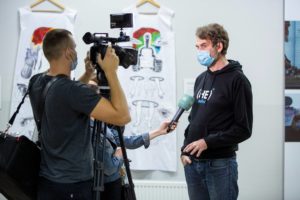Content
(NOT)war: realizing oneself and boundaries in “Donbas Diaries” dialogues
On 12 October 2020, the exhibition “(NOT)War: realizing oneself and boundaries in ‘Donbas Diaries’ dialogues” was opened in Kyiv.
The exhibition is the outcome of a dialogue between young people from Ukraine and from Russia: More than 20 participants of the dialogue process aged between 18 and 29 were sharing and reliving their experience of perceiving the war and being in it. They were meeting in 2019-2020: at first, they had national meetings, separately in Ukraine and in Russia, and then – dialogue meetings and the artistic workshops abroad, in Sarajevo and in Vilnius.
The exhibition was opened by the Ambassador of Germany in Ukraine, Ms. Anca Feldguzen. She spoke about the devastating impact of war on the lives of people, in particular children and adolescents. Ms. Ambassador is confident that today’s youth will be able to provide the country, the region and the world with a better, peaceful future.
Nearly 40 artworks are presented at the exhibition: collages, photos, videos and texts. One sleepless night of discussing emotions has also become a piece of art.
“One of my favourite projects is “No result”, when a group of young people had to reflect on the experience the other participants had when being in Sarajevo. Following a sleepless nights and fruitless search of the artistic form they suddenly understand that this very process is their main outcome, it is their joint art-project. Their attempts to find common language and to articulate a complicated topic together is, in fact, their creative expression, exactly what they were looking for”, adds art-curator in charge of the artistic process Elena Afanasieva.

The communication was not easy. In the beginning, the participants were learning to trust each other, to open up, to release tension while speaking about difficult and painful issues.
“There was a moment of the emotional explosion when they jointly discovered that the same story is presented entirely different in their countries, while the participants had witnessed certain events”, said Svitlana Krot who has been coordinating the project from Ukrainian side, the Head of the NGO “Country of Free People”. “When we don’t talk to each other, it is very easy to manipulate information. When we speak about our experience and listen to the others, we become free from the influence of someone else’s motives”.
A dialogue process, especially during wars, is an essential component of ‘soft’ or ‘people’s’ diplomacy. In some way, dialogue is a peace-making process, says one of the project’s facilitators, trainer Maksym Ieligulashvili:
“We are used to see peacebuilding through the prism of ‘blue helmets’ or negotiations of those in power. However, the practice of last decades proves that the readiness of the society as a whole and individuals in particular, peace agreements, no matter how good they are, are doomed from the moment they are signed. We cannot organize dialogue processes for millions of people but we can use a specific dialogue process to look for new expressions, new narrative that can play a role in rehumanization and understanding what is going on with me and around me. In this project, we have worked on the complex methodology of the search, elaboration and rebroadcasting of the dialogue experience through modern are. I truly hope that this set of tools with help return and restore contacts with residents of controlled territories and residents of all non-government-controlled territory of Ukraine”.
The dialogue process as well as its artistic component took place within the project ‘Donbas Diaries’ of the international civil society platform CivilM+ which unites 20 independent civil society organizations from Ukraine, Russia and the EU. The project was coordinated by the German NGO DRA and the Ukrainian NGO ‘The Country of Free People’. The name of the organization that coordinated the engagement of Russian participants is not disclosed due to security concerns for civil society activists in Russia.
The artworks and additional information is available in the booklet of the exhibition.
The exhibition will be open from 12 till 17 October in All-Ukrainian Youth Center at 17, Esplanadna Street, Kyiv.
